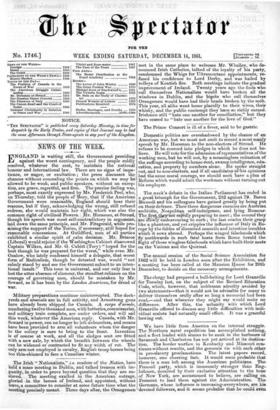NEWS OF THE WEEK.
}ENGLAND is waiting still, the Government providing against the worst contingency, and the people coldly resolved, whatever the cost, to maintain the national honour and international law. There are no signs of impa- tience, or anger, or exultation ; the press discusses the chances without concealing the points on which we may be allowed to be weak, and public speakers, without an excep- tion, are grave, regretful, and firm. The precise feeling was, perhaps, most exactly expressed by Mr. Frederick Peel, who, on Thursday, told the people of Bury, that if the American Government were reasonable, England should hear their reasons, but if they, acknowledging the wrong, still refused redress, she would maintain her right, which was also the common right of civilized Powers. dr. Horsman, at Stroud, though his speech was most self-contradictory in argument, laid down the same principle, and Mr. Fitzgerald, while pro- mising the support of the Tories, if necessary, still hoped for reasonable concessions. At Guildford, men of all parties exhibited a similar spirit of ,calm decision. Mr. Briscoe (Liberal) would rejoice if the Washington Cabinet disavowed Captain Wilkes, and Mr. G. Cubitt (Tory) " hoped for the best though he was prepared for the worst," while even Mr. Onslow, who lately confessed himself a delegate, that worst form of Radicalism, though he detested war, would "not calmly stand by and see the Government submit to an inten- tional insult." This tone is universal, and our only fear is lest the utter absence of clamour, the steadfast reliance on the courage of governing men, should be mistaken by Mr. Seward, as it has been by the London American, for dread of war.






























